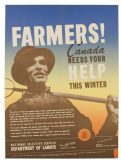Saskatchewan farm groups are in Ottawa this week to voice concerns over rail transportation and grain handling.
Representatives from the Saskatchewan Wheat Development Commission (SWDC), the Saskatchewan Barley Development Commission (SBDC) and the Agricultural Producers of Saskatchewan (APAS) are meeting with members of the federal government this week to voice farmers’ concerns and lobby Ottawa for improved policies and regulations.
“Over and over we see that Western Canadian grain farmers are being uniquely and significantly affected by failures in the transportation and handling system, and consequently losing billions of dollars,” said Cam Goff, chair of Sask Barley.
Read Also

Women who fed a nation
More than 40,000 young women supported the war effort between the 1940s and early 1950s, helping grow and harvest crops amid labour shortages. They were called Farmerettes.
“We are in Ottawa this week to bring this message directly to … the federal government and to ensure they are hearing the voices that are often lost at this level of politics – those of the farmers.”
A report published in December suggests that Western Canadian grain farmers lost an estimated $3.1 billion in 2013-14 crop year due to rail transportation delays and high basis levels.
Prairie farmers stand to lose a significantly higher amount this year, the farm groups claim.
In February 2015, the excess basis cost for grain farmers, relative to the posted costs for rail freight and primary and terminal elevator charges, was more than $62 per metric tonne or $1.69 per bushel, the groups said in an April 28 news release.
“These numbers mean that farmers marketing 2,000 tonnes in 2014-15 will lose $80,000 to $120,000, depending on when they market their grain” said Bill Gehl, Sask Wheat chair.
“These numbers really reinforce the need for improved government regulations of the industry.”
The Saskatchewan farm groups have also submitted recommendations to the Canada Transportation Act review panel, suggesting improvements to the grain transportation and handling systems.
The recommendations included the completion of a formal costing review and adjustments of the maximum revenue entitlement or MRE, also known as railway revenue caps.
They also recommended the creation of a rail oversight group that includes farmer representation and enhanced mandatory reporting requirements.















